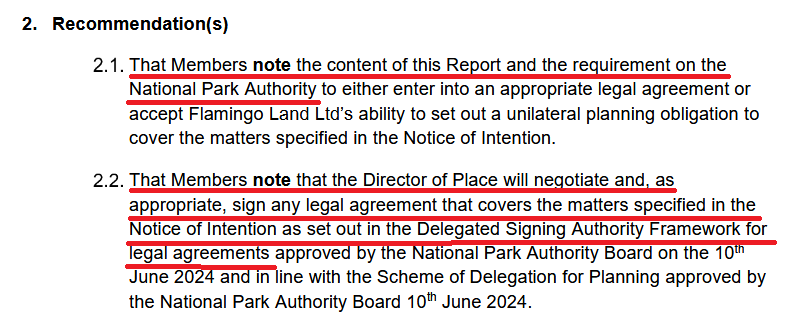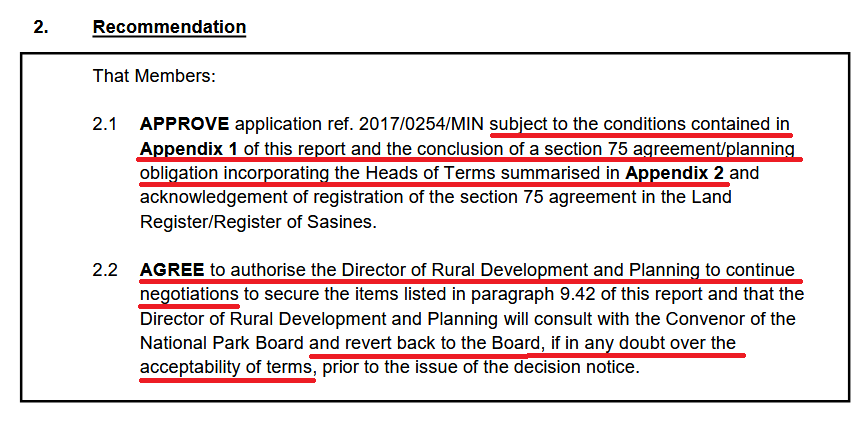The Loch Lomond and Trossachs National Park Authority (LLTNPA) board meeting on Monday (9th June) is being asked to consider a paper “Process and timeline Re: PPA-002-2021 Notice of Intention Lomond Banks” (see here). The paper was published late – according to the LLTNPA’s Standing Orders that should happen a week before a board meeting – and the title pure Planning Speak but it is about what LLTNPA senior management say should happen next with the Flamingo Land Planning Application. This post explains how, if agreed, it will hand all power to the very staff who paved the way for the development and tried to cover up their involvement in appointing Flamingo Land as preferred developer for the site (see here) and (see). I go on to argue that if the LLTNPA Board was serious when they rejected the application last September they need to re-assert their control and use the powers they have to make it as difficult as possible for the Flamingo Land AND the Scottish Government.
On 16th May, following the Scottish Government Reporter’s predictable decision (see here) that he was minded to grant Flamingo Land Planning Permission in Principle, subject to the completion of legally binding planning conditions, Dr Heather Reid the Convener issued this statement which was widely reported in the media:
“We stand by the reasons for the Board’s unanimous decision to refuse this planning application and it is deeply disappointing that the Reporter has taken a different view. We will now take some time to go through the report and to understand its implications.”
Sounds good? It took just seven days for LLTNPA senior management to issue an update to Heather Reid’s statement in which they falsely claimed (see here) the LLTNPA were “required to work to conclude a legal agreement on the terms prescribed by the Reporter”, i.e could do nothing more. What the Reporter actually stated (see here – para 402) was this legal agreement could either be negotiated between the LLTNPA and Flamingo Land or unilaterally submitted by Flamingo Land or that, failing either, he would “consider whether planning permission should be refused or granted without a planning obligation” [i.e legal agreement].
The important point here is the LLTNPA is NOT required to negotiate a legal agreement on the terms set out by the Reporter but if it decided to try and do so could develop the draft planning conditions in a way which made it as difficult as possible for the Flamingo Land development to go ahead. Flamingo Land would, of course, be likely to withdraw from negotiations carried out on this basis and submit their own version of planning conditions but imagine the political outcry that would then ensue. The LLTNPA Board could also at this stage decide to prepare for an appeal to the the Court of Session under Section 239 of the Town and Country Planning (Scotland) Act 1997 (see here).
(I have previously wrongly referred to this process as a “judicial review” rather than an appeal. The process is like a judicial review but appeals have to be submitted within 6 weeks – rather than 3 months – of a planning decision. My thanks to the person who pointed this out to me).
Although the paper sponsored by Stuart Mearns, now Director of Place, to the LLTNPA Board on Monday notes these processes it does not provide any opportunity for board members to discuss how best they might respond. Instead, it tells board members that staff will go ahead and negotiate an agreement with Flamingo Land under delegated authority:

This represents an a usurpation of power by the senior management of the LLTNPA responsible for the Flamingo Land planning application getting this far, Stuart Mearns, and his boss, Gordon Watson the Chief Executive. What the paper should have done is set out various options for the Board to consider how they could standby their decision, including those I have mentioned above. Having obfuscated the right of LLTNPA board members to decide what to do following the rejection of their decision by the Scottish Government Reporter, the report states Stuart Mearns “will negotiate…….and sign” a legal agreement with Flamingo Land under the “Delegated Signing Authority for Legal Agreements”.
In June 2024 the LLTNPA was asked to consider and approve a revised Scheme of Delegation which extended the powers of the Appointed Officer, i.e Stuart Mearns, on planning matters. These changes were agreed just a few months before the board meeting which rejected the Flamingo Land application and the timing was not in my view a coincidence. However, contrary to what is claimed in para 5.3 of the current board report, para 4.1.9 in Part II of the revised scheme of delegation (see here) does NOT give wholesale delegated authority to Mr Mearns to negotiate what is in Section 75 or other legal agreements. It reads:

“Responding” and “participating” is not the same as deciding and while the powers he was given under this clause enabled Mr Mearns to prepare the LLTNPA’s response to Flamingo Land’s appeal and submit this to the Reporter there is no mention legal agreements. Moreover, Paragraph 5 of the Scheme of Delegation, not mentioned in the Board Report, specifically excludes decisions about major planning applications from delegated powers but if there is any doubt about this the Scheme of Delegation states that:
“Further, the Director of Place may decide that the particular circumstances of a matter which would in the normal course of events be dealt with under this Scheme of Delegation PART B, are such that the matters should be determined by the Planning and Access Committee or the Park Authority Board (as the case may be)”.
There is little doubt therefore that the LLTNPA Board has the power to decide both HOW to respond to the Reporter’s Notice of Intention to approve the Flamingo Land Development and, if was minded to instruct staff to try and negotiate a legal agreement with Flamingo Land, it could require it to come back to the board for final approval.
It is important to appreciate here that the Board Report on the Flamingo Land planning application did not include any outline planning conditions precisely because it was recommending the application be rejected. For the appeal, however, Mr Mearns and his staff drafted a draft set of 57 planning conditions and an outline Heads of Terms for a Section 75 Legal Agreement. In my view most of these were very weak and completely unenforceable and they were further reduced in number by the Reporter. These conditions have NEVER been scrutinised or approved by the LLTNPA Board.
That is a glaring democratic deficit and totally wrong. In the case of the Cononish Goldmine in February 2018 (see here), board members were given a set of planning conditions to consider along with the report and recommendation from staff that the planning application be approved. They then explicitly authorised Mr Mearns, whose then title was Director of Rural Development and Planning, “to continue negotiations” on the board’s behalf:

Moreover, paragraph 9.43 of that board report stated “If minded to approve this application, Members are asked to authorise delegation to the Director of Rural Development and Planning authority to continue negotiations to secure arrangements which will support the satisfactory planning outcomes discussed in this report.”
By contrast, in the case of Flamingo Land, staff are now trying to ensure that board members have absolutely no say in what happens next.
If current board members were genuine in the reasons for rejecting the Flamingo Land planning application, they must now challenge staff about the paper at the board meeting on Monday and insist on their right to decide options and to approve legal agreements. If they fail to do this it will confirm that the Board Meeting in September was a piece of theatre designed to appease the public by making it appear they had now decided to oppose the Flamingo Land planning application while in reality they were ensuring their reasons for objection were very weak and could easily be overturned by the Reporter.
“Loch Lomond does not need a visitor attraction, it is the attraction” (Emma the poet)
My apologies for another technical post but it is important for people to understand how staff in the LLTNPA continue to subvert planning processes and undermine democracy in the planning system in the National Park.
There are lots of other people now writing eloquently about why the Flamingo Land application should be rejected, including Emma the poet who spoke the words above at the public meeting in Balloch a week ago. As an antidote to the technicalities, I can recommend two recent pieces published by Common Weal, from Tam Brotherstone, on “Loch Lomond is a right not an opportunity “(see here), and Robin McAlpine, on “Flamingo Land is the power of money distorting reality” (see here). (I am Convener of Common Weal’s Care Reform Group, but had no idea these articles were appearing).
I hope to write a post in due course which collates links to the many other excellent articles that have appeared on Flamingo Land recently and reflects the anger that is being expressed about the decision across Scotland. This presents an opportunity to reform what in my view is a corrupt National Park, with a “noddy board” who do whatever staff tell them, and a corrupt planning system more generally.
If you want to take action, the focus of campaigners at present is to put pressure on Ivan McKee, the Minister for finance with responsibility for planning, to call in the application and overturn the Reporter’s Notice of Intention to approve the development. One thing you could ask McKeeMinisterPF@gov.scot is to investigate the role of LLTNPA staff in paving the way for this development, appointing Flamingo Land as preferred developer and subverting democracy.
If you want to attend or view the discussion at the LLTNPA board meeting on Monday, the paper is due to be discussed soon after the start at 10.30 and you can get details of the venue (the LLTNPA HQ at Carrochan) and video link, which will be published when the meeting starts here. The next item, at 11.45 presents a report on a plan for the Pierhead at Balloch, which makes not a single mention of the Lomond Banks/Flamingo Land development or its likely impact on the Pierhead Area!
